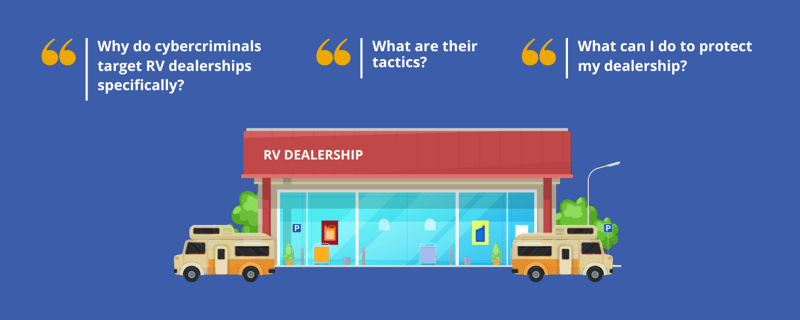As a dealer, you know that customers keep your wheels turning, and data security is essential to customer retention. In fact, 84% of customers say they would not buy another vehicle from a dealer if a breach compromised their data. Recreational vehicle (RV) dealerships, like auto dealerships, are no exception to cyberattacks. In recent years, cybercrime has evolved significantly. Gone are the days of lone hackers in dark basements. Now, cybercriminals operate in well-organized, well-funded groups that work together to infiltrate and exploit organizations' networks.
As cyberattacks become more common and sophisticated, it’s essential to recognize the growing importance of cybersecurity for your RV dealership.
You might be wondering: Why do cybercriminals target RV dealerships specifically? What are their tactics? And what can you do to protect your dealership?

Why Cybercriminals Target RV Dealerships
It’s important to recognize that motivations can vary among different threat actors. Some potential reasons why RV dealerships could be attractive targets for cybercrime include:
Valuable Customer and Employee Data
RV dealerships, similar to auto dealers, collect and store vast amounts of sensitive customer and employee data. This data often includes names, addresses, phone numbers, email addresses, financial information, and Social Security numbers, all of which are highly valuable.
Cybercriminals can steal customer and employee data from RV dealerships and sell it on the dark web. This stolen data is often used for various fraudulent purposes, such as making unauthorized purchases, obtaining free medical care using stolen identities, and more. The potential profit from selling large amounts of private information can be substantial for cybercriminals. In fact, the FBI reports that the potential total loss due to identity theft was $10.2 billion in 2022 — a significant increase from $6.9 billion in 2021.
To help businesses proactively manage their customer data and combat increased threats, the Federal Trade Commission (FTC) released the FTC Safeguards Rule in June 2023. These amendments impact the protective security measures required of non-banking financial institutions, including your dealership.
Outdated IT Systems and Policies
In many cases, RV dealerships have IT systems and policies that are outdated or not given the top priority they deserve. This oversight can leave them vulnerable to cyberattacks, as cybercriminals prey on weak points in security infrastructure.
Identifying these vulnerabilities within your dealership is necessary to finding the best defense against cyberattacks. You know your customer and employee information is valuable, but so do potential hackers. Investing in up-to-date IT systems can help prevent data breaches and damage to your dealership.
Cybercriminals’ Most Common Tactics
The landscape of cybercrime is constantly evolving, and new methods continually emerge. Some of the tactics cybercriminals have been known to use include:
Phishing
Sophisticated phishing emails are a common way cybercriminals target RV dealerships. Since 91% of data breaches start with an email phishing attack, it’s not surprising that many dealerships rate phishing as their main concern. One frequent tactic criminals use is impersonating executives and sending seemingly legitimate wire transfer requests to employees in the accounting department. If successful, the criminals receive the wired money, causing significant financial losses to the dealership. For example, a recent case involved an employee of Wilkins Recreational Vehicles, Inc., falling prey to a phishing email. This resulted in information from 17,408 customers being compromised.
Ransomware Attacks
According to Cybercrime Magazine, global ransomware damage costs are predicted to exceed $265 billion by 2031. With 71% of ransomware attacks targeting small and medium-sized businesses, these damages can be catastrophic. In such attacks, cybercriminals encrypt data on the dealership's computers or network and demand a ransom to unlock it. They may even threaten to leak the data or inform customers if the ransom is not paid promptly, putting immense pressure on the business to comply.
Having the ability to recognize an attack on your dealership means staying informed on cybercriminals’ methods. Phishing and ransomware attacks pose significant threats to your dealership and shouldn’t be taken lightly.
How to Protect Your Dealership From Cyberattacks
To protect your dealership from cyber threats, a proactive approach to cybersecurity is vital. An effective security program includes the following three things:

Advanced Technology Solutions
Invest in technology solutions that include firewalls, encryption tools, intrusion detection systems, and regular software updates to keep systems secure. To ensure your dealership is as protected as possible, you’ll want a trusted team of experts on board. These individuals should be professionally trained in automotive cybersecurity to monitor your systems 24/7/365 and provide comprehensive systems and trainings.
Employee Training
On average, the cost of one data breach in 2022 was $4,350,000. By contrast, the average cost for cybersecurity training is only $2,700 per employee. As your first line of defense, your employees should be trained to look for suspicious email triggers. Educate employees about cybersecurity best practices, such as recognizing phishing attempts, creating strong passwords, and avoiding suspicious links or downloads. Having the appropriate cybersecurity measures and employee training in place will determine how far into your network these hackers can get.
Regular Audits
Conduct regular cybersecurity audits to assess vulnerabilities and address any weaknesses promptly. You don’t know where your vulnerabilities are if you don’t test your system and your processes.
While RV dealerships may be prime targets for cybercriminals, taking proactive measures to enhance cybersecurity can significantly reduce the risk of falling victim to cyberattacks. By investing in the right tools, expertise, and employee training, you can protect your dealership’s data, finances, and reputation from the ever-evolving threat of cybercrime. Remember, it's not a matter of if, but when, cybercriminals strike, so being prepared is essential.